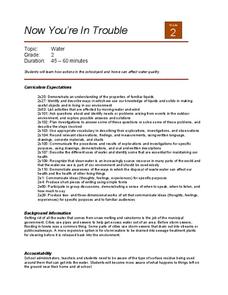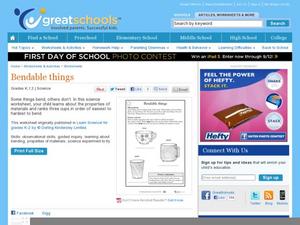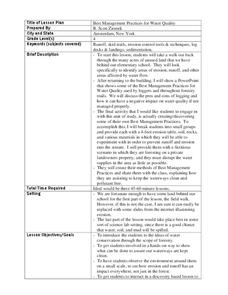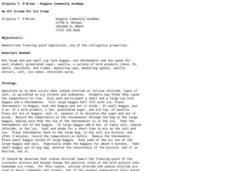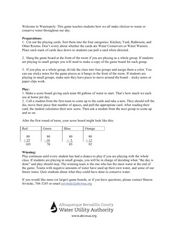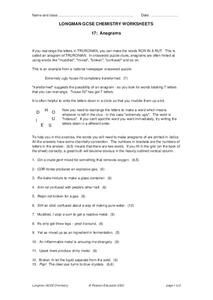Curated OER
Now You're In Trouble
Second graders study how actions in the schoolyard and home can affect water quality. They discuss how rainwater can clean plants and sidewalks on its way to storm sewers. They draw an example of a simple maze that represents the maze...
Curated OER
Properties of Air
Fourth graders participate in a demonstration lesson using bubbles in which they determine that air fills the bubbles. Next, they work in small groups as they they experiment with the properties of air at separate work stations. After...
Curated OER
Rain Formation
First graders investigate the different water formations by conducting an experiment. In this water properties lesson, 1st graders examine jars filled with ice, rain water, air and snow in their class. Students predict what...
Curated OER
Solid Water
Students turn solid water (ice) into liquid water. In this solid and liquid water lesson plan, students use water, ice, cups, and heat in order to change water from one state to another. They draw their findings as well.
Curated OER
Water and Ice
Students explore water and ice. In this 3 states of matter lesson, students work with a partner to observe, illustrate, and describe the characteristics of an ice cube in a cup. The ice cube is observed again in 15 minutes and changes...
Curated OER
Unit 2: Global to Local: Understanding My Place in the Hydrosphere
What does the ground around your home have to do with water pollution? Young ecologists learn about their local watershed and create their own cause-and-effect models of the hydrosphere.
University of Chicago
Don't Be Too Flaky
Snow, ice, and water are all composed of H2O. Does that mean they all have the same volume? Discover the ways that the densities of these substances determine their volumes, and how they change based on their current states of...
Curated OER
Bendable Things
What kinds of cups can bend? Kindergartners find out with a straightforward science inquiry, designed to teach them about the properties of materials. They hypothesize about the flexibility of a china cup, a plastic cup, and a paper cup....
Bonneville
Compost Bioreactor Design
Organic waste is a hot topic. The second of three installments in the Bioreactor Water Heating unit challenges pupils to create bioreactors that collect energy released from compost. After watching videos on the properties of water and...
American Chemical Society
Liquids - Clearly Unique
Bring chemistry to life for scholars as they perform two tests to examine the unique properties of three liquids. Classroom investigators make observations, develop basic lab skills, and follow step-by-step instructions to compare water,...
American Chemical Society
Solubility Test
Make sure to consult the teacher's handbook, Inquiry in Action - Investigating Matter Through Inquiry, for two demonstrations that can be done to introduce solubility and measuring crystal mass before having the class conduct this...
American Chemical Society
Using Chemical Change to Identify an Unknown
If you discover an unknown powder, how do you determine if it is safe? Lesson uses four different tests to identify the properties of various powders that appear the same. Then scholars get an unknown powder and have to determine which...
Curated OER
Science: Heat Quiz
For this science: heat quiz worksheet, students answer ten questions, not interactively, about heat, water and temperature with the answers at the bottom of the screen.
Curated OER
Why Do Ice Cubes Melt?
First graders investigate water properties by participating in a hands on experiment. In this ice formation lesson, 1st graders examine real ice cubes in a bowl and identify the reasons why certain cubes melt faster than others. Students...
Curated OER
Best Management Practices for Water Quality
Fourth graders examine best management practices for water quality. In this water quality instructional activity, 4th graders explore unused land to identify areas of runoff, erosion, and effects of water flow. Students...
Curated OER
Properties of Soaps
Students investigate 3 types of soap. In this properties of soaps lesson plan, students test soap with pepper and observe the reaction between the two. They make observations of the 3 types of soaps and make a chart to compare each. They...
Curated OER
Periodic Properties Lab
Students investigate the periodic properties of elements in the periodic table. In this periodic properties lesson plan, students experiment with elements from the Alkaline Earth Metals, the Halogens, the Transition Metals, and for extra...
Curated OER
We All Scream for Ice Cream
Students investigate the freezing point depression of water while making ice cream. In this colligative properties lesson plan, students make ice cream using ice, salt and water to freeze milk and sugar. They measure the temperature of...
Curated OER
To Float or Not to Float, That is the Question?
Ninth graders develop operational definition of density, do computations using density equation, categorize pieces of matter as being able to float on
water or not, based on density, explain why some objects sink or float based on...
Curated OER
Properties of Acids and Bases
Students observe and investigate properties of acids and bases. In this acids and bases lesson plan, students perform 5 different experiments including reactions of acids and metals, reaction of acids with carbonates, neutralization...
Curated OER
The Scientific Method Using Mystery Powders
Students use the scientific method to determine physical and chemical properties of unknown substances. In this scientific method lesson plan, students discuss chemical and physical properties of substances as a class after a...
Curated OER
Air Is there
Students experiment to observe air and its mass. In this air instructional activity, students use the scientific method to complete experiments that demonstrate the properties of air. Students view a video as follow-up.
Curated OER
Wateropoly: Life in the Desert
Students explore water properties by participating in a drought related board game. In this water conservation lesson, students play a game titled "wateropoly" which is based on the classic board game Monopoly. Students utilize cards and...
Curated OER
Anagrams
In this chemistry worksheet, students complete a crossword puzzle by rearranging 13 anagrams about elements. They create their own anagrams from 3 given words.


